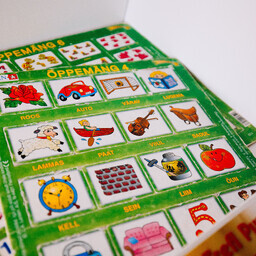Eelmise aasta lõpus võttis riigikogu vastu uue alusharidusseaduse. See hakkab kehtima tänavu septembrist. Uus seadus toob kaasa, et poolteise- kuni kolmeaastased lapsed käivad edaspidi lastehoius. Sõimerühmi enam ei ole.
Uus seadus toob kaasa ka uued määrused. Näiteks on nüüd
alushariduse riiklik õppekava
. See õppekava väärtustab õppe- ja kasvatustegevuse planeerimist lapsest lähtuvalt. Lisaks sätestab see kolmeaastase lapse eeldatavad üldoskused. Näiteks tähendab see, et jälgitakse, kas kolmeaastane laps suudab väikeses rühmas mängule keskenduda või lihtsamaid mängureegleid järgida.
alushariduse riiklik õppekava
Tõlge fraasile: alushariduse riiklik õppekava
EN
national curriculum for early childhood education
Eesti alushariduse juhtide ühenduse esinaine Heda Kala ütleb, et üks tähtis märksõna on
varajane märkamine
. Kui lastehoidu tulevad lapsed alates pooleteisest aastast, on oluline, et nii varases eas märgata ja toetada laste arengut. Kui on
eakohasest arengust kõrvalekaldeid
, saab lapsele võimalikult vara tuge anda. Alla kolmeaastasena on kõige parem aeg sekkuda ja aidata lapse arengule.
varajane märkamine
Tõlge fraasile: varajane märkamine
EN
early detection
eakohasest arengust kõrvalekaldeid
Tõlge fraasile: eakohasest arengust kõrvalekaldeid
EN
deviations from age-appropriate development
Lastehoidude liidu tegevjuht Mari Kummeri ütleb, et selline areng on positiivne. Lapsehoidjad jälgivad, kuidas lapsel läheb, millised oskused ta on omandanud ja milliseid on vaja toetada. See on
pidev protsess
terve õppeaasta jooksul. See ei ole mingi test, vaid pigem jälgimine ja
vanematele tagasiside andmine
.
pidev protsess
Tõlge fraasile: pidev protsess
EN
continuous process
vanematele tagasiside andmine
Tõlge fraasile: vanematele tagasiside andmine
EN
providing feedback to parents
Varem sellist kohustust ei olnud, aga paljud lastehoiud on juba teinud endale õppekava ja jälgivad lapse arengut. Tartu Ülikooli üldpedagoogika õpetaja Maria Jürimäe rõhutas, et
õppekavas üldoskuste sätestamine
ei tähenda väikelastele hinnete panemist. See tähendab nende arengu jälgimist ja
dokumenteerimist
.
õppekavas üldoskuste sätestamine
Tõlge fraasile: õppekavas üldoskuste sätestamine
EN
setting general skills in the curriculum
dokumenteerimist
Tõlge fraasile: dokumenteerimist
EN
documentation
On väga tähtis, et me ei kaotaks ühtegi inimest. Kui märkame vara kellelgi probleeme või puudujääke, võib see olla tingitud arengukeskkonnast. Lasteaiaõpetaja või -hoidja saab arutada, mida kodus lapsega tehakse, kui palju ta on näiteks ekraani ees. Võib-olla laps areneks muidu hästi, aga talle on loodud keskkond, mis ei toeta seda. Just see ongi selle hindamise mõte.
Lastehoidude
õppekavad peavad valmis olema
järgmise aasta suve lõpuks.
õppekavad peavad valmis olema
Tõlge fraasile: õppekavad peavad valmis olema
EN
curricula must be ready
At the end of last year, the Riigikogu adopted a new Early Childhood Education Act. It will come into effect this September. The new law means that children aged one and a half to three will attend childcare centers. Nursery groups will no longer exist.
The new law also brings new regulations. For example, there is now a national curriculum for early childhood education. This curriculum values planning educational and upbringing activities based on the child. Additionally, it sets out the expected general skills for a three-year-old child. For example, it means monitoring whether a three-year-old child can focus on play in a small group or follow simpler game rules.
The head of the Estonian Association of Early Childhood Education Leaders, Heda Kala, says that one important keyword is early detection. Since children start attending childcare centers from the age of one and a half, it is crucial to notice and support their development at such an early age. If there are deviations from age-appropriate development, the child can receive support as early as possible. Under the age of three is the best time to intervene and aid the child's development.
The CEO of the Union of Childcare Centers, Mari Kummeri, says that this development is positive. Childcare providers monitor how the child is doing, what skills they have acquired, and which ones need to be supported. This is an ongoing process throughout the entire academic year. It is not a test, but rather monitoring and providing feedback to parents.
Previously, there was no such obligation, but many childcare centers have already created their own curriculum and monitor child development. Maria Jürimäe, a teacher of general pedagogy at the University of Tartu, emphasized that setting general skills in the curriculum does not mean grading young children. It means monitoring and documenting their development.
It is very important that we do not lose anyone. If we notice problems or deficiencies early in someone, it may be due to their developmental environment. A kindergarten teacher or caregiver can discuss what is done with the child at home, how much time they spend, for example, in front of a screen. Perhaps the child would otherwise develop well, but an environment has been created for them that does not support this. This is exactly the point of this assessment.
The curricula for childcare centers must be ready by the end of next summer.

